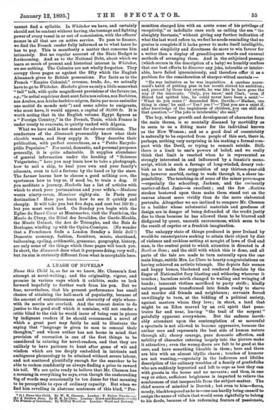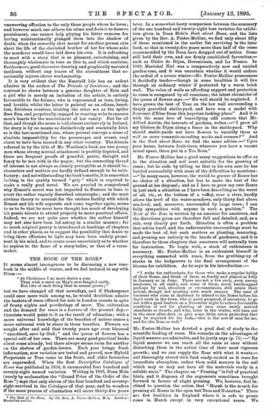A LEASH OF NOVELS.*
Name this Child is, as far as we know, Mr. Chesson's first attempt at novel-writing; and the originality, vigour, and promise in various ways which it exhibits, make us look forward hopefully to further work from his pen. But we fear, nevertheless, that his present performance has small chance of attaining the hall-mark of popularity, because of the amount of sententiousness and obscurity of style where- with its merits are overlaid. And the utmost desire to do justice to the good stuff which it contains, will not render a critic blind to the risk he would incur of being rent in pieces by indignant readers if he should recommend a novel of which a great part may fairly be said to illustrate the saying that "language is given to men to conceal their thoughts," and whose author has not borne in mind that provision of recreation is one of the first things to be considered in catering for novel-readers, and that they are unlikely to have patience to hunt after gems of wit and wisdom which are too deeply embedded in intricate and ambiguous phraseology to be attained without severe labour, and not scattered plentifully enough for the searcher to be able to reckon confidently on always finding a prize to reward his toil. We are quite ready to believe that Mr. Chesson has a meaning in everything he says, even though the enshrouding fog of words may occasionally be too dense for that meaning to be perceptible to eyes of ordinary capacity. But when we find him revelling in abstruse sentences of this kind, " Pre- • (1) Name this Chad. By W. H. Chesson. London: T. Fisher Unwin.— (2.) A Bootless BMW. By M. E. Le Clerc. London : Hurst and Blackett.—(3.) The Friends of Innisheen, By Wilfrid Woollam. London: Ward and Downey.
monition charged him with an acute sense of his privilege of receptivity," or indefinite ones such as calling the sea "the almighty foretaste," without giving any further indication of what the last word refers to, we feel he needs reminding that no genius is complete if it lacks power to make itself intelligible, and that simplicity and directness do more to win favour for a writer than a display of grandiloquent words and unusual methods of arranging them. And in the subjoined passage (which occurs in the description of a baby) we humbly confess that our best efforts to discover any joke, tolerable or intoler- able, have failed ignominiously, and therefore offer it as a problem for the consideration of sharper-witted mortals :—
" He was imitative as he was inquisitive. A careless nurse- maid's habit of putting pins in her mouth stirred his ambition; and, pierced by those tiny swords, he was like to have gone the way of the innocents. Only, you know,' said Clark, even if Herod had spitted him, he could never have been a saint?— ' What do you mean ?' demanded Mrs. Davids.—' Madam, one thing is clear,' he said.—' Yes ? yes ?'—' That you are a saint if,. after knowledge of the impishness of children, you can still ask that question.'—' The joke is intolerable,' she said."
The boy, whose growth and development of character form the main theme, is so mentally diseased by morbidity aa to seem to us a fitting mate for the individual known as the New Woman; and as a good deal of eccentricity is naturally to be expected from people of this sort, there is, perhaps, nothing very surprising in his making a formal com- pact with the Devil, or trying to commit suicide. Still,
there is a limit to one's powers of belief, and we really think that limit is reached when he is represented as
strongly interested in and influenced by a lunatic's manu- script, which is such a farrago of long-winded, dreary rub- bish as to make the supposition of any thirteen-year-old boy, however morbid, caring to wade through it, a sheer im- possibility. The touching-in of some of the minor personages —especially the schoolboy, Jackson, and the eminently matter-of-fact Janie—is excellent ; and the few effective strokes bestowed upon them make them stand out on the canvas almost more vividly than do the more elaborated portraits. Altogether we are inclined to compare Mr. Chesson to a builder whose substantial materials and goodness of
design are in danger of being defrauded of the credit justly due to them because he has allowed them to be blurred and
disfigured by queer, uncouth excrescences, which seem to be the result of caprice or a freakish imagination.
The unhappy state of things produced in poor Ireland by would-be emancipators seeking to attain their object by dint
of violence and reckless setting at nought of laws of God and man, is the central point to which attention is directed in A Bootless Bene ; and the skill with which this is done, and all parts of the tale are made to turn naturally upon the one main hinge, entitle Mrs. Le Clerc to hearty congratulations on having achieved an artistic triumph. She depicts fair scenes and happy homes, blackened and rendered desolate by the finger of Nationalist fury blasting and withering wherever it touches ; harmless mirth changed to wailing and wringing of hands ; innocent victims sacrificed to party strife ; kindly natured peasants transformed into fiends ready to starve and murder old friends and neighbours; servants forced unwillingly to turn, at the bidding of a political society, against masters whom they love ; in short, a land that might be an Eden marred by an evil spirit that pene-
trates far and near, leaving "the trail of the serpent" painfully apparent everywhere. But the sadness inevit- ably attendant upon the contemplation of so mournful a spectacle is not allowed to become oppressive, because the author sees and represents the best side of human nature through all ; cheery courage, pure domestic affection, and
nobility of character entering largely into the picture make it attractive ; even the wrong-doers are felt to be good at the core, and have something likeable in them ; here and there are bits with an almost idyllic charm ; touches of humour
are not wanting,--especially in the ludicrous and lifelike description of the culinary troubles of a family of gentlefolks who are suddenly boycotted and left to cope as best they can with guests in the house and no servants ; and thus, in one way or other, sufficient brightness is imparted to relieve the sombreness of tint inseparable from the subject-matter. The chief source of mischief is Derrick ; but even to him—fierce, moody, blacktempered as he is—one can hardly bring oneself to assign the name of villain that would seem rightfully to belong to his deeds, because of his redeeming feature of passionate, unswerving affection to the only three people whom he loves ; and however much one abhors his crime and feels it to deserve punishment, one cannot help pitying his bitter remorse for having unintentionally plunged them into the shadow of death, when the cowardly shot meant for another person cuts -short the life of the cherished brother of her for whose sake the murderer would have laid down his own. It is refreshing to meet with a story that is so pleasant, entertaining, and thoroughly wholesome in tone as this is, and which contains, furthermore, good character. drawing and graphically narrated incidents, without any traces of the slovenliness that oc- casionally injures clever workmanship.
It is very evident that the Emerald Isle has an ardent admirer in the author of The Friends of innisheen ; and the contrast be shows between a genuine daughter of Erin and a girl who is merely an imitation of the article, is entirely favourable to the former, who is represented as true, loving, and lovable, whilst the latter is painted as an odious, heart- less, frivolous creature, treating the other sex as the spider does flies, and perpetually engaged in weaving webs to ensnare men's hearts for the nourishment of her vanity. But for all that, and though the scene is laid almost exclusively in Ireland, the story is by no means as distinctively and essentially Irish as is the list-mentioned one, whose perusal conveys a sense of absolute impossibility for the personages and events read about to have been located in any other country. The friends referred to by the title of Mr. Woollam's book are two young men whose strong mutual attachment is prettily depicted, and there are frequent proofs of graceful, poetic, thought and fancy to be met with in the pages ; but the connecting thread of interest is not always as clearly perceptible as it should be ; characters and motives are hardly defined enough to be satis- factory; and notwithstanding the book's merits, it is somewhat lacking in the quality termed " grip " which is required to make a really good novel. We are puzzled to comprehend why Ernest's secret was not imparted to Eustace in time to avert the rather vaguely described catastrophe ; and the most obvious theory to account for the curious facility with which Ernest and his wife separate and come together again, seems to us to be that he must have thought too much of developing his poetic talents to attend properly to more practical affairs. Indeed, we are not quite sure whether the author himself may not also have been led astray in a similar manner ; for so much original poetry is introduced as headings of chapters and in other places, as to suggest the possibility that desire to bring these effusions to light may have been unduly promi- nent in his mind, and to create some uncertainty as to whether he aspires to the fame of a story-teller, or that of a verse- maker.



































 Previous page
Previous page